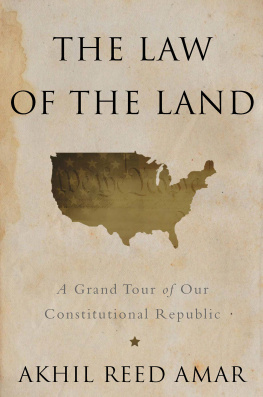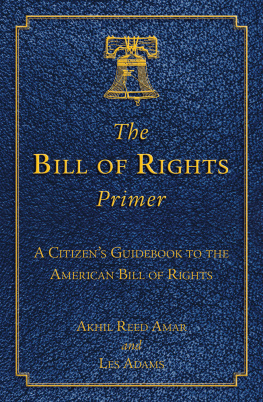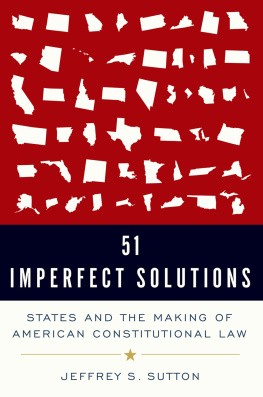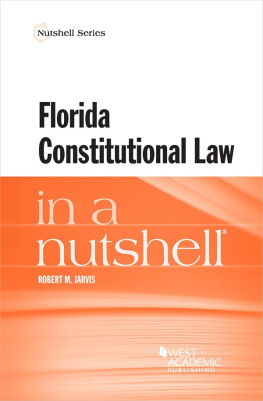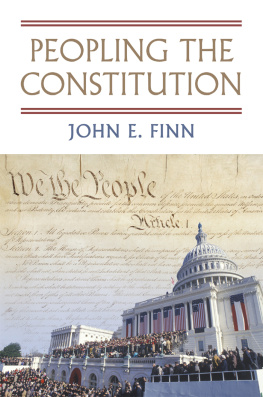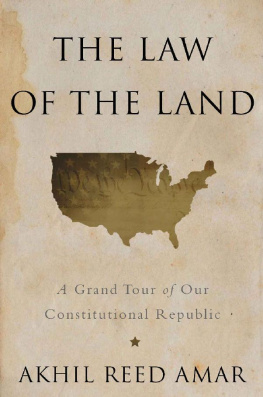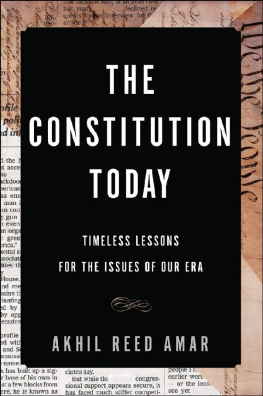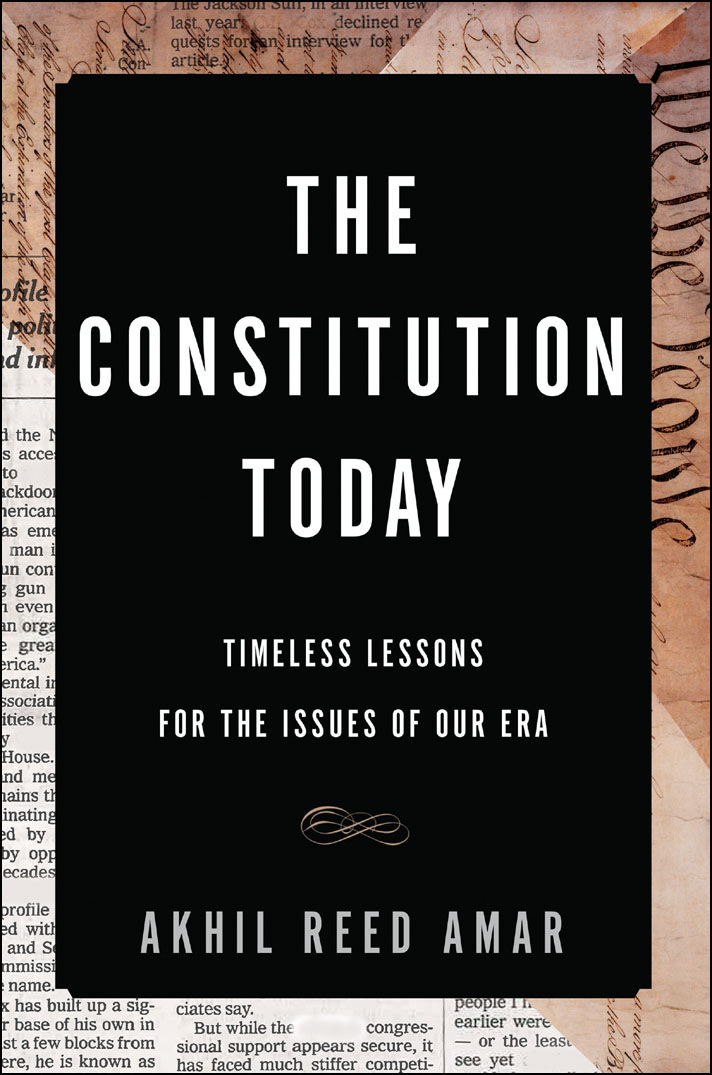Table of Contents
Guide

Ive been working on this book for most of my adult life. My debts, intellectual and personal, are thus many and profound.
THANKS, FIRST AND ALWAYS, to my family and friends. I began writing op-eds as a high schooler in the early 1970s, with the sustained encouragement of my parents, who continue to encourage me in every way, lo, these many years later. Ruth Ann White, my high school journalism adviser, helped me take my first baby steps as an aspiring essayist. Every would-be author needs an audience, and back then, my best buddy, Kevin King, was also my most faithful reader. (In Chapter 6 of my 2015 book, The Law of the Land, I tell the story of how Ruth Ann, Kevin, and other friends stood by me when my high school principal sought to censor my anti-Nixon op-ed columns.) In 1973, my inspired and inspirational cousin Raj Chabrahimself a student journalist at a nearby high schoolgave me one of the best gifts ever: a book of journalistic essays by the San Francisco Chronicle political satirist, Art Hoppe. That book, Mr. Nixon and My Other Problems, along with another early 1970s journalistic tour de force, All The Presidents Men, first got me thinking about how seemingly discrete and separate journalistic pieces might over time add up to something much more.
In 1976, on my eighteenth birthday, I arrived at Yale, sight unseen, and I have never left. Here I made an additional set of friends, and several of my closest friends eventually became occasional journalistic partners. Ian Ayres, Steve Calabresi, Josh Chafetz, and Neal Katyal all fit that category, and so does my most intimate and frequent journalistic collaborator, Vikram David Amar. True, I met Vik long before Yaleon the day he was born, in fact. But it was only when my kid brother arrived as a student at Yale Law Schoolon the same day that I started teaching as a professor at Yale, in 1985that we met intellectually, and began to talk law and think law together.
Memorys fog makes it hard for me now to compile a complete list of all the other friends at Yale who have nurtured me in connection with the various ideas in this book. But special mention must be made of my most stirring teachersBruce Ackerman, Guido Calabresi, Owen Fiss, Paul Gewirtz, the late Burke Marshall, and Peter Schuckand my closest Yale conversation partners over the years (other than those already mentioned): Jack Balkin, Philip Bobbitt, Stephen Carter, James Forman, Heather Gerken, Abbe Gluck, Linda Greenhouse, Oona Hathaway, Harold Koh, Tony Kronman, John Langbein, Jed Rubenfeld, Reva Siegel, Kate Stith, and John Witt. Among my students and assistants, I am especially indebted to Robert Black, Maggie Goodlander, Sundeep Iyer, Iulia Padeanu, Monika Piotrowicz, Anthony Ramirez, and Jacqueline Van de Velde for their incisive editorial and logistical aid as this book took shape.
Beyond Yales ivied walls, I must also offer special thanks to two more coauthors, Gary Hart and Timothy Noah, and to various other faithful friends and interlocutors: Todd Brewster, Rick Brookhiser, Jennifer Brown, Jon Blue, Stephen Colbert, Walter Dellinger, Alan Dershowitz, Ken Gormley, Dale Gregory, Paul Johnson, Ed Larson, Sandy Levinson, Eric Liu, Gene Meyer, Trevor Morrison, Mike Paulsen, Bob Pushaw, Diane Rehm, Dean Reuter, Charlie Rose, Paul Solman, Ken Starr, Steve Susman, Jeff Toobin, Nina Totenberg, Laurence Tribe, Bruce Wessel, Evan Wolfson, Sam Zurier, and the late Peter Jennings and Doug Kendall. Si Lazarushimself a gifted legal journalistwas particularly helpful in the final stages of this book, offering detailed suggestions just when I needed them.
On the home front, few of the pieces in this book would likely have been written without the steady support of my wife, Vinita. On the other hand, many more pieces would likely have been written had it not been for our kidsVik, Kara, and Sara. But most of these pieces would likely have been miserable because I would have been miserable without our kids. To put the point within the intellectual frame of this book: Day to day, the kids can drive me crazy, but over time they make life worth living.
IN THE WORLD OF PROFESSIONAL JOURNALISM and book publishing, I owe thanks to many friends and mentors. I have already mentioned that Art Hoppes journalistic writing motivated me in the early 1970s. When I graduated from high school in 1976, he moved me yet again by sending me a sweet and witty letter of encouragement and discouragement. One of my teachers had apparently sent him several of my high school columns and he wrote me back directly, telling me that I had talent and should thus stay out of the newspaper business and find honest work instead: He didnt want the competition.
I have generally found inspiration in a series of academic authors who have combined high-quality journalism with penetrating legal, political, historical, and/or constitutional analysis. These academic role models span the political spectrum and I love reading them: Will Baude, Stephen Carter (again), Garrett Epps, Noah Feldman, Linda Greenhouse (again), Jeff Rosen, Cass Sunstein, Garry Wills, and Eugene Volokh.
I owe particular thanks to three journalistic editors who repeatedly helped me place my work before the public in real time: Emily Bazelon, Jeff Rosen, and Chuck LaneEmily when she was at Slate, Jeff and Chuck when they were at the New Republic. Far and away, Emily accepted and edited more pieces in this collection than anyone else, and her edits were unfailingly incisive. Plus, she was always a dream to work withfast, witty, and generous. She is, quite simply, the best. So are Jeff and Chuck, gifted former students who drew me deep into the world of professional journalism by bringing me into the New Republic family as a contributing editor in the late 1990s. Other great editors deserving special mention are: Linc Caplan, Sue Horton, Ken Ikenberry, Kate Julian, Dahlia Lithwick, Lily Rothman, Allison Silver, Mark Joseph Stern, June Thomas, Michael Tomasky, Gary Spiecker, Scott Stossel, and Terry Tang.
Another memorable editor, Peter Beinart, ran the New Republic from 1999 until 2006. When I shared with Peter my desire to write a series of New Republic pieces using timely hooks to say something more timeless, he listened politely and firmly said no. As he put it in an e-mail to me, The stuff for us has to clearly respond to todays news. It cant be a contemporary peg for a historical point. At the time, these were hard words for me to hear, but today I would like to thank Peter publicly for helping me see clearly the temporal tension at the heart of my effort to do what I am calling here constitutional journalism.
My deepest professional thanks are reserved for three unindicted coconspirators who have stood by me to bring this book to market: my literary agents, Glen Hartley and Lynn Chu, and my publisher, Lara Heimert. I have never told her this, but Lara is my muse. When I close my eyes at the keyboard and try to think of something smart to put on the page, I picture myself talking to her. This is the third book that Glen, Lynn, Lara, and I have done together, and I cant wait to get cracking on the next one. I would also like to offer my public thanks to Laras entire Basic Books team, especially Brian Distelberg, Carrie Majer, Leah Stecher, Michelle Welsh-Horst, and Michele Wynn.
IT REMAINS TO SAY A FEW MORE WORDS about one more muse, whose influence has, I hope, been evident from start to finish. This book is dedicated to Bob Woodward for many reasons. Several are elaborated in the final paragraphs of this books Conclusion: Woodward offers a powerful model of a journalist who is willing to acknowledge his own role in shaping as well as covering events, who listens to all sides and who commands respect across the spectrum, and who is willing to revisit earlier stories with the benefit of hindsight. But that is not all. As I now have come to see things, my entire career owes a huge debt to this good and great man, whom I am today tickled to call my friend.
Next page

